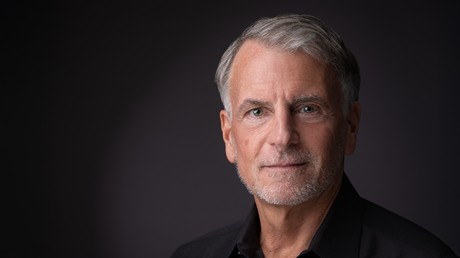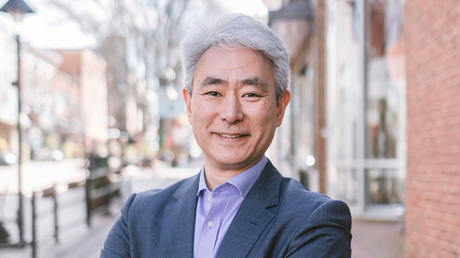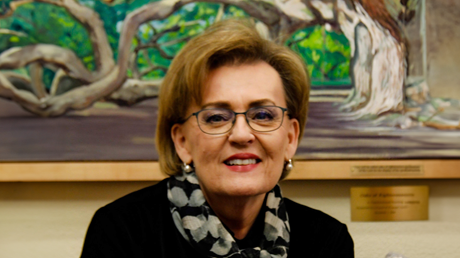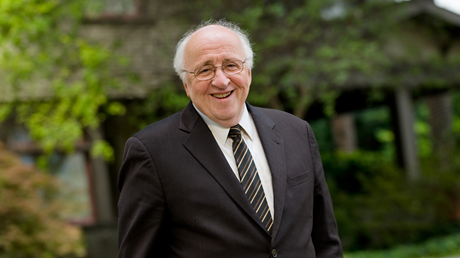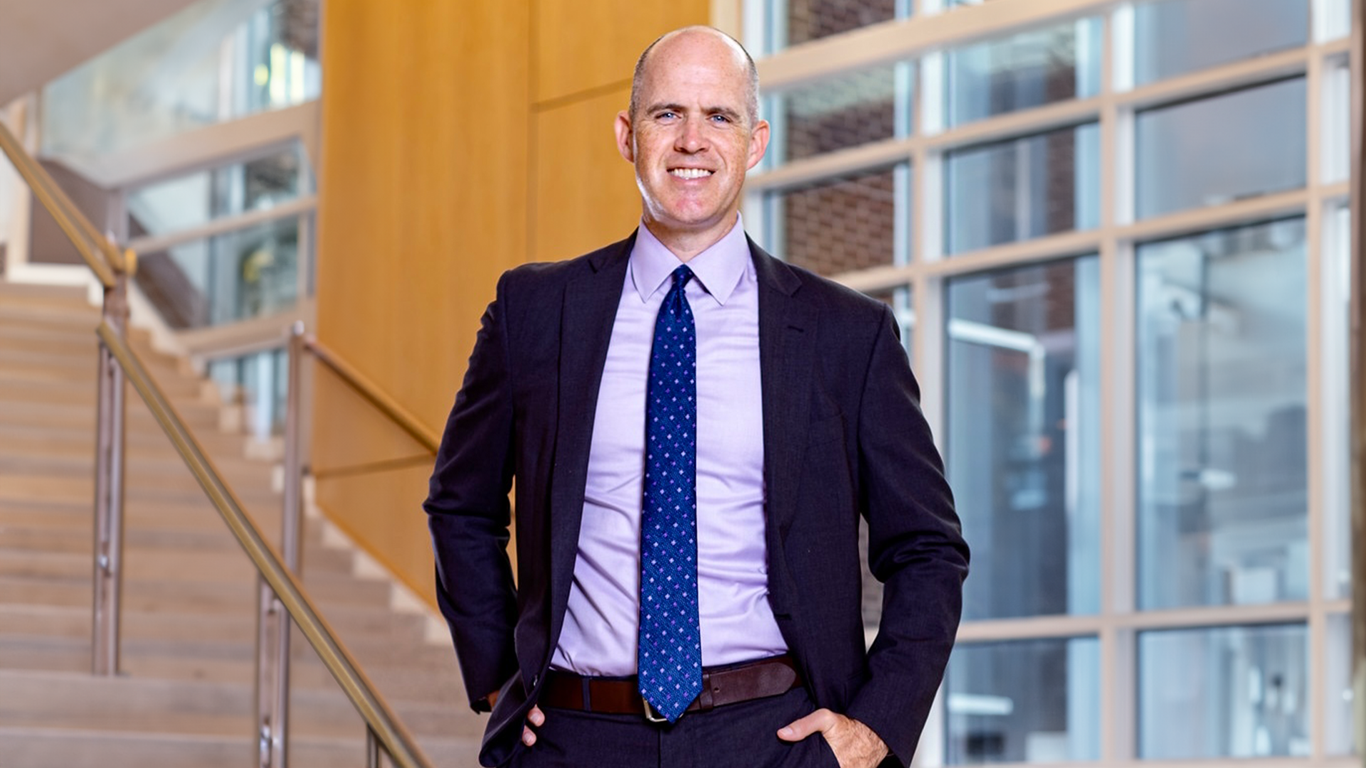
Will you help encourage and connect the church?
Give NowWill you help encourage and connect the church?
Give NowOne Wednesday in 2023, a chapel service at Asbury University didn’t end. Instead, over the next 16 days, Christians from around the world joined students at the Wilmore, Kentucky, school, repenting, confessing, and worshiping alongside one another.
The outpouring, sparked among a generation that saw the pandemic erase many cherished milestones and has suffered numerous mental health challenges, deeply encouraged Asbury president Kevin Brown and inspired his article for CT titled “What the Asbury Revival Taught Me About Gen Z.”
Brown recently shared with Morgan Lee his thoughts on Gen Z’s search for authenticity, why he believes Christianity stands no chance without the church modeling the faith that it preaches, and how CT might play a role in this.
As a college president, what have you learned about Gen Z that you find most surprising or counterintuitive?
There’s a sweeping desperation across the United States and our world that I think is most acutely felt by younger generations. They want something distilled and real to anchor into amidst the dynamism of this moment.
This is the most marketed-to generation in history, so opinions and propositions are often just dead on arrival. Gen Z elevates and prioritizes authenticity.
One thing became clear during the outpouring: When they’re in, they’re really bought in. They’re willing to be challenged, and they desire to make a difference.
It’s obviously easy to point out the challenges of Gen Z, like anxiety and depression, leaving the church, skepticism toward religion and of institutions, and the fact that they’ve been discipled by phones and social media. But I see sensibilities that have uniquely positioned them to be a corrective to the pockets of casual Christianity that have marked our church landscape over the last quarter century and have emptied the pews.
My hope and confidence is that we’ll see the emergence of a corrective generation in the years to come.
How has the pandemic marked Gen Z?
I’ve wondered if the pandemic didn’t bend the curve in a new direction so much as it accelerated existing trend lines. As I see it, the pandemic heightened some of the struggles previously associated with Gen Z, like addiction, depression, anxiety, and suicidal ideation. That’s obviously bad news.
It is really hard to be a young adult at any place in time. But parents, educators, and ministers will attest it’s really hard—really hard—in this moment. At the same time, there’s an opportunity in that, because there’s this trenchant dissatisfaction. There’s such a hunger for something authentic and authoritative and good and true. So the pandemic equally accelerated the opportunity for the Christian church in this moment.
The best metaphor I can use about the outpouring—or the revival—is just hunger and hunger met. People were just dumping themselves on the altar. They were putting phones on an altar. You just saw desperation. But that desperation was met.
Now, it’s one thing for someone like me—I’m going to be 47 this year—to put my phone on the altar. But [it’s another] for someone for whom a phone is so part and parcel of their life to say, “This is killing me or paralyzing me or eroding me from the inside.”
The final day of the outpouring, I was in the balcony, and someone from the stage was giving a prophetic word over all of the Gen Z teens and young adults in the room and said, “You will not be the generation defined by depression, anxiety, suicide, and addiction.”
Someone later said, “If we had the spiritual eyes to see it, we would have seen an altar filled with loosened chains.” Or like the Charles Wesley hymn:
Long my imprisoned spirit lay
Fast bound in sin and nature’s night;
Thine eye diffused a quick’ning ray,
I woke, the dungeon flamed with light;
My chains fell off, my heart was free;
I rose, went forth and followed Thee.
What was unfolding in that moment was just so breathtakingly powerful. But I’m not nostalgic. These are not the “good old days.” I’m asking, “What will the Lord do with this generation in the days ahead?”
What did you learn about spiritually reaching Gen Z that you think is going to be the hardest for the church to actually put into practice?
We need to be thinking carefully about this moment that we’re in and how we convey our faith to the younger generation. We’re no longer in an Evidence That Demands a Verdict kind of moment as made popular in the 1990s by folks such as Josh McDowell, Ravi Zacharias, or Norman Geisler. We aren’t going to attract people to faith based upon its rational merits. Instead, to paraphrase the British Anglican priest Alison Milbank, we need to perform our argument. Young people aren’t looking for the bumper sticker or the six reasons why the resurrection happened. They want an embodiment of the countercultural claim that Jesus is Lord, lives lived in a way that would be unusual unless this is true.
There’s an expression by Henry David Thoreau that the value of something relates to how much life it cost you. I’ve just wondered if we’ve displayed a low-cost—and therefore low-value—Christian faith. Gen Z just has no interest in that. If that’s what’s presented, of course it’s been rejected.
Therefore, the biggest challenge for the church in reaching this generation is to embody our faith in all of its radical forms.
I used to be part of a group that encouraged Christians to be radical in their generosity. There was a video of evangelist Bill Bright, and he was wearing an old ’70s suit with outdated, oversized peak lapels and this ugly tie. It was not cool. But I felt our students would be totally into this guy. Why? Because Bright determined early on the amount of income his family needed to live by and then agreed that anything beyond that would be given away. He held true to that principle, even when his ministry became really large and successful and when he received a Templeton award, and was given a million dollars.
That’s the kind of authenticity that our students—that Gen Z—really resonates with.
What does CT do well?
I really began to pay attention when my grad work became more theologically serious in the mid-2000s. I wanted to know who the voices coming out of this publication were and what they were thinking about the world.
Gabe Lyons at Q Ideas has said something to the extent of, “If the world's talking about something, we're going to talk about it and what it means for the Christian faith.” In many ways, that seems to be CT’s ethos as well. You can find an article on a significant social issue or a major sports story and how it relates to Christianity.
I’ve just deeply appreciated that CT will report on matters that pertain to believers, and that it’s rooted in historical orthodox Christian faith and practices a “big tent” Christianity.
CT helps us learn to be faithful and see the world in a faithful way.
What role do you think CT has to play in reaching Gen Z Christians?
I’ve never liked the term middle way. Some of my colleagues in Christian higher education use that expression to avoid excesses of left and right. I want to avoid the excesses of left and right too, but it still locates institutional identity and self-understanding on a horizontal axis that is politically hued.
We want our self-understanding to be defined in relationship to our proximity to Christ and to participation in the life of God. In other words, I want it to exist on a vertical axis that asks, “How close can we get to God? How close can we get to his heart in 2024? How close can we mirror his holy character? How close can we pattern unity between God the Father and Jesus Christ the Son?”
The goal is not the middle. The goal is vertical.
These kinds of expressions communicate to Gen Z that we don’t have some ulterior political agenda. That we’re serious about Christ, not just contemporary issues. In that sense, CT can be a critical voice for its entire readership, but particularly for young adults as well, because they’ll see that there’s only one agenda: Jesus is Lord. Now, how do we follow him and express that faithfully in our contemporary moment?
The questions Gen Z is asking are really interesting. I have long appreciated Pastor Steve Deneff at College Wesleyan Church in Marion, Indiana. Years ago, he said very presciently, people aren’t asking the church what it believes about right and wrong. They’re asking if it works.
Russell Moore, CT’s editor in chief, has noted that young adults are walking away from the church not because they don't believe what the church teaches, but because they aren’t sure the church itself believes what the church teaches.
When the world and Gen Z see moral failures, politicized faith, abuses of power, and lukewarm Christianity, it doesn’t matter what the church thinks. It doesn’t matter what Christians believe. They want to see it lived. They want to see that it makes a difference.
Gen Z hungers for something that “demands my soul, my life, my all,” as Isaac Watts writes about in “When I Survey the Wondrous Cross.” Otherwise, it’s just another opinion.
Another part of CT’s role is to tell the truth and identify moral failures—shine a light on dark places. Where do we get it wrong? CT, of course, can also document and highlight God’s work among godly people. When are we faithfully adhering to the scriptural mandate of what it means to embody Christ’s followership? When are we a beacon of hope and goodness? These are stories that need to be told.
How do you look back on the Asbury outpouring?
I will celebrate what happened at Asbury in February 2023 the rest of my life. At the same time, I’m not sentimental. I want us to look forward.
For instance, we’ve had around 60 student groups who have gone out and shared about the outpouring. Two students recently attended a conference in South Africa where they shared about their experience, and it was received really well.
But then what students found interesting was that people said, “That’s great. Now, let me tell you about what God is doing in South Africa. And let me tell you about what the Lord is doing in other continents, countries, and churches across the globe.”
In other words, these Christians were helping our students to locate their experience among a broader unfolding of God’s work throughout the world. That’s incredibly encouraging!
My prayer is that in two years, five years, ten years, we’ll look back at the outpouring and say, “That has been eclipsed and exceeded by other outbreaks of God’s Spirit, especially among Gen Z.”


